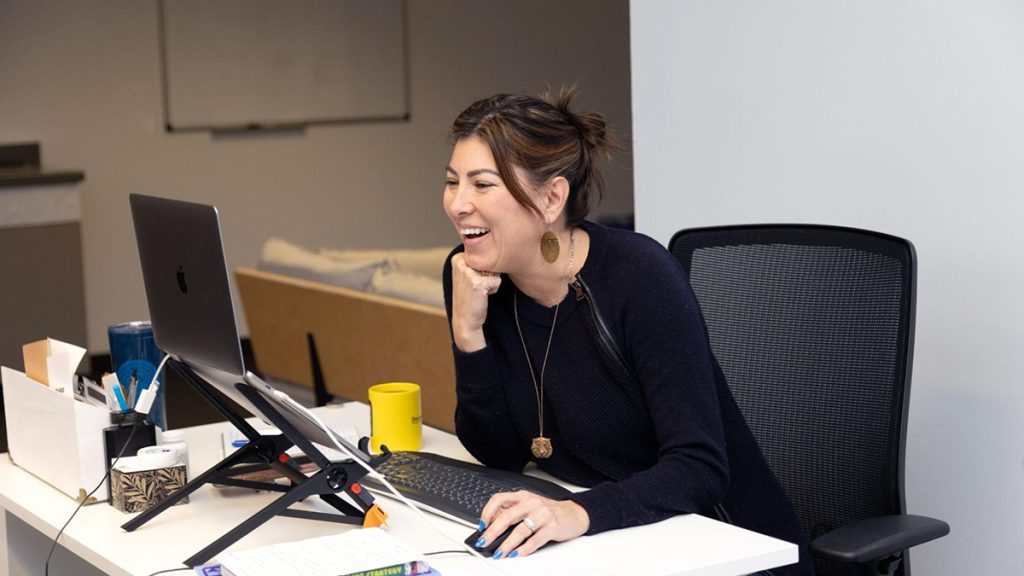
Photo: Leo Sage
The case for treating the news like a campaign
At Outlier Media, Sarah Alvarez learned that making an impact for low-income Detroiters meant reporting on complex problems and not letting up
When Sarah Alvarez first founded Outlier Media, an investigative and service-focused media organization in Detroit, Michigan, housing access was one of the biggest unmet needs in the city. Through their innovative and award-winning journalism, Alvarez and a growing team of reporters and editors helped Detroiters get accountability from absentee landlords, housing developers, and city officials.
I sat down with Alvarez, who currently serves as the James B. Steele Chair in Journalism Innovation at Temple University in Philadelphia, Pennsylvania, to learn more about the values at the center of her work, the relationship between journalism and impact, and how journalists can approach impact-driven coverage of seemingly intractable social and economic issues.
Our conversation has been edited and condensed for clarity and readability. This is the first of a two-part conversion.
Sarah Alvarez: Service is the animating force of my work, and always has been. And with the question about service there is also the question about utility.
There’s a risk that comes with service work. You could easily get into a situation where the benefit is more to the provider than the receiver. The news can be more successful when we are delivering things people have told us they want and can use. We can not make all the choices and feel good about what we do. That makes service about us-and that is not service at all.
One of the questions I ask myself is: Can we measure utility in order to know that we’re providing service? Can we push really hard on these questions of utility so that we can evaluate our level of service? This is especially important because in a nonprofit context, the incentives get really messy really quickly because the person you’re trying to make happy is often the funder and not the client.
The process of defining, creating and measuring impact is not static. I am not at Outlier Media anymore, but their work is always changing. There is a built in process to ask: Is this enough? Is this good enough? What should be different? How could we do it better?
Nicole Lewis: Service is the thread that connects your work to the work of The Marshall Project.
We’re an investigative organization and focused on impact. Much of our work is about documenting where things are going wrong, systemically. Highlighting where there’s abuse, where there’s a bad actor, and showing, with a high level of detail about what is actually happening in the system. And the hope is that a lawmaker will see it, they’ll be outraged, and they’ll act.
That is a “top-down” theory of how impact happens. So I began asking myself: How are we going to serve people at the center of our investigations? Is it useful to have those harms documented in an authoritative way? Absolutely. For some communities, it just doesn’t have that same kind of utility. It doesn’t allow them to take the next step. This is where a service-driven approach can be really useful.
Alvarez: What you’re really talking about, and I think what many of us in this work are now trying to do is to be a facilitator. That’s a very different level of service. We’re willing to decenter the journalistic function. The question isn’t just how do you create utility with your work? It’s: How does your work become a utility? This framework is helpful in a lot of ways, because sometimes information is just not the driver. For certain problems, information has less utility sometimes.
Lewis: Yeah! The work is less risky if you know that your journalism and your reporting is not THE answer. You’re going to have a better conversation going into communities, engaging with your audience, thinking about the people you want to “serve” by also assuming that there are answers embedded within the community itself.
Often the problems we’re investigating have existed for so long, and that’s really where we get the most interesting information. For really intractable social problems, people have found all kinds of ways to adapt. They live within the dysfunction, right? There’s wisdom within that experience, right? It’s not just abject suffering all the time. There’s creativity.
Alvarez: Another aspect of this whole approach is the question of need. Whose needs are most acute? And to whom would information make the biggest difference?
In some cases, if there’s resources within the community or if there are already solutions working in the community— we’re going to keep moving on to find the place where there are fewest resources. In these cases we get to stretch to see if there’s anything that we can do within the bounds of our profession to affect some kind of impact. This is especially true for issues where a community has exhausted its resources. They have done everything that people say they’re supposed to do to create accountability. But nothing is happening.
You just throw everything at the wall. You just try everything in the toolbox. And you can ask yourself what else should be here? These are the places where we will get to new levels of value. Because we know that we’re not duplicating efforts and we know that we’re not taking credit for a value that would be created without our support.
Lewis: Can you talk a little bit about the commitment to that work. Journalism can be really fleeting. We come in, we ask questions, we write our articles, and then we move on. But what you’re talking about sounds like an investment. Can you say a little bit more about what that looks like?
Alvarez: Yes, we don’t move on until the conditions have changed. It is absolutely what people want us to do: Stay on this shit until it’s fixed! That is an easy case to make with the community. But it is not an easy case to make with funders.
And you can know that by measuring the need. So if you do a needs assessment, however you do it, as long as it’s rigorous, then you see that conditions must have changed, because this issue is not rising to the top anymore. And it makes clear that issues that seemed intractable are not truly intractable. So then we move on to the next thing that seems intractable.
Housing in Detroit was such a big issue. It was the biggest need when Outlier started. There are still people who have tremendous needs and still some accountability issues that we’re reporting on. But it is not the only thing we do anymore. And that is largely because market conditions changed a lot. There is still a lot of housing inequality there, but there’s more movement in the market than ever before. People are able to rent more places. People are able to sell their homes. More people are able to repair a home. That was just not true before. And it’s partly because of accountability around race and lending and all those things. It’s also just partly like a reflection of the economy.
Lewis: To create results or real world impact means you are continually writing the stories, continually trying to think about the form, continually thinking about the need for the service. Staying persistent, treating it like a beat.
Alvarez: Absolutely. And the beat is determined by the need. And when the need goes away: We will move on. But until then, we’re not moving on. It’s so important to remember that news organizations follow other news organizations. When I first got to Detroit, and all I did was, like, report on the tax auction, a lot of other reporters were kind of like: This has been going on for a long time. Why concentrate on it? What’s new about it? Nothing’s new about it! Nothing has changed. That is why we should report on it.
It was interesting to see the approach actually move the rest of the reporters to be, like: You’re right. We can do this. This is a place where we would create change. And it did work.
Lewis: You’re treating journalism almost like a campaign. If you have an issue, from a journalistic perspective, you don’t let up until there is some movement. You can’t just stay on an issue for three months. It’s years of work, right?
Alvarez: It can be so uncomfortable for reporters and editors to even kind of think through that process. Because when you say campaign: They say: Oh My God.
But you can think of it in that way, without having a particular outcome that you’re tied to, right? It can be hard to get some reporters and editors, who have not been so impact-focused, to understand that the thing you’re trying to get to is accountability. The thing that you’re trying to get to is the closing of an information gap. The thing that you’re trying to get to is the reduction of harm.
We would love to hear from your efforts to experiment with journalism-based change-making. Feel free to fill out this survey to stay in touch.
Cite this article
Vo, Lam Thuy; and Lewis, Nichole (2025, Nov. 6). The case for treating the news like a campaign. Reynolds Journalism Institute. Retrieved from: https://rjionline.org/news/the-case-for-treating-the-news-like-a-campaign/

